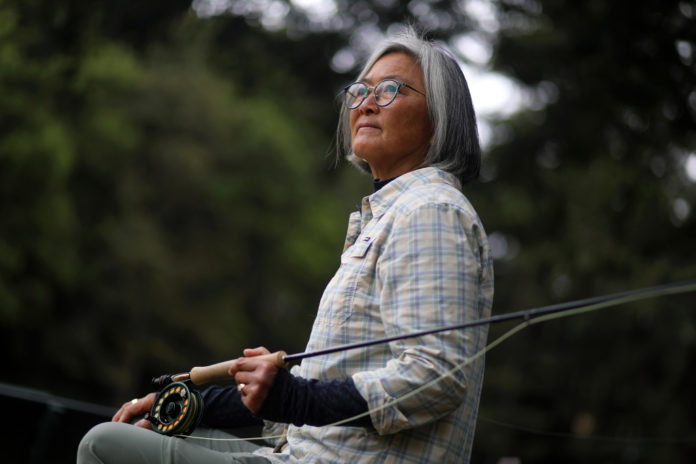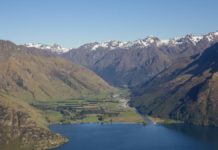It’s not about the fish. It’s not even about the beautiful, peaceful surroundings of a swiftly running river. At least not entirely.
For 64-year-old Janice Azebu, of Lafayette, it’s about the challenge.
“I used to spin cast,” Azebu says, “but fly fishing is a wonderful new challenge. Knowing the river, picking the right fly, casting the line just right. For me, it’s the challenge of all those things.”
Azebu, a physician and medical director for Kaiser East Bay Hospice, is a relative newcomer to fly fishing, but she’s part of a growing number of women attracted to the sport.
Q So how did you start fly fishing?
A I did spin casting for 30-40 years. It was just a nice pastime. You go to some beautiful areas. I always say fish don’t live in ugly settings.
I happened to teach my next-door neighbor how to fish, and then he turned around and learned to fly fish. He took me out and gave me some early lessons. I liked it right away. It’s really fun. It’s not just about catching fish or catching the biggest one. There’s something about it, the challenge of casting. It’s really difficult to do it with a (long) line, so when you first start out, you start with a shorter line, but you’re learning a technique to be able to cast further out.
Q What other challenges are there?
A You have to understand the river and what the fish are eating. There are a lot of flies — well, they aren’t all flies. That term pertains to all sorts of things that mimic fishes’ natural diet. There is a whole range of insects that fish eat: grasshoppers, stone flies, the larva of mayflies.
You gradually learn, but because of my work schedule, I wasn’t able to go very often, and every time I did, I felt like a beginner having to learn everything over again. I’ve gotten better with repetition. It’s something I really love and hope to do more when I retire in June.
Q How common is it to see women involved in fly fishing?
A It’s become so popular that now companies are producing clothing for women. We don’t have to buy men’s waders any more.
There also are a lot of women’s fly fishing clubs, and it’s a little less intimidating for women to get into the sport by joining a club. Many of the instructors say that women are better students of fly fishing because we’re listening to what the teacher is saying, not trying to muscle the rod.
Q What other aspects of fly fishing make it appealing to you?
A It’s special, standing in a river in a beautiful setting. There are not a lot of people. You can hear your own thoughts. Fly fisher people tend not to like to fish around other people, so you’re in more quiet, private waters.
Q Can anyone learn?
A You don’t need special talent. Pretty much anyone can do the sport. If you’re able to hold the rod and move your arm, you can learn it. I’m sure anyone can fish, even from a wheelchair.
Q What are some of your favorite spots to fish?
A Northern California has wonderful rivers full of fish. I like the Redding, McCloud, Fall, Sacramento and Trinity rivers. Recently, I’ve started going up to Idaho to Henry’s Fork.
You can fish on lakes from the bank, but it’s more difficult because of the trees and bushes that are behind you. For your fly to go forward, it has to go an equal distance behind you. Standing in a river allows you to do that without getting tangled. I like fishing on moving water. I like to fish for trout, especially steelhead.
5 fly fishing clubs
Golden West Women Flyfishers, San Francisco, www.gwwf.org
Bay Area Fly Fishers, Oakland, www.bayareaflyfishers.org
Flycasters Inc. of San Jose, Cambell, www.flycasters.org
Tri-Valley Fly Fishers, Livermore, tri-valleyflyfishers.org
Peninsula Fly Fishers, Belmont, www.peninsulaflyfishers.org
Find more California clubs at Flycaster.com, www.flycaster.com/clubs/alifornia3.html
Credit: Source link





























